Taliban Decrees Shortening Afghan Women’s Lives, Says UN
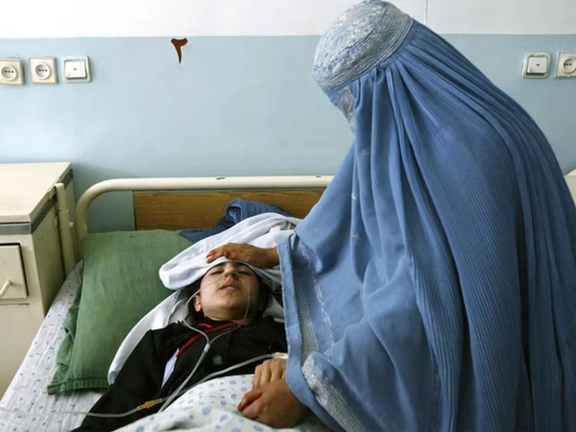
Four years after the Taliban’s return to power, Afghan women are living shorter and less healthy lives as a result of the group’s restrictive decrees, the United Nations said on Monday.

Four years after the Taliban’s return to power, Afghan women are living shorter and less healthy lives as a result of the group’s restrictive decrees, the United Nations said on Monday.
In a statement issued on 11 August, the UN said the Taliban have introduced a series of measures limiting the rights of women and girls, with “devastating” consequences. It reported that more than 78 percent of Afghan women are neither in education nor employed, making it increasingly difficult for them to find work.
The UN warned that this exclusion means nearly half of Afghanistan’s potential workforce is making no significant contribution to the economy, compounding the crisis in a country already facing economic collapse.
Due to women’s restricted access to healthcare, maternal mortality is projected to rise by 50 percent by 2026, the UN said, attributing the increase largely to the Taliban’s discriminatory policies.
It also reported an increase in child marriage and growing levels of violence against women, both at home and in public.
Afghan women have not only been excluded from public life but, according to the UN, 62 percent say they have no role in decision-making even within their own households.
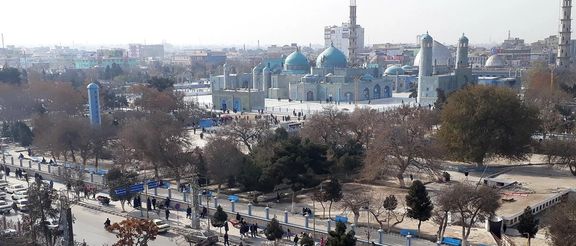
The Taliban’s morality police have detained a man in Balkh province on charges of “insulting sacred beliefs” and making controversial comments about Islamic history, the group’s Ministry for the Propagation of Virtue and Prevention of Vice said.
In a statement on 11 August, ministry spokespersons said the man, identified as Jamshid, a resident of Balkh, was tracked down and detained by morality police.
Obaidullah Haqqani, head of the ministry’s directorate in Balkh, alleged that the suspect had made “contradictory remarks on social media about the existence of God and the Battle of Uhud, which hurt people’s religious sentiments.”
The case has been referred to Taliban courts for “Sharia-based” proceedings, according to the ministry.
The Taliban have previously detained multiple people on similar charges. In the most recent case, a teacher in Paktika province was arrested for allegedly “insulting the Prophet of Islam” and later sentenced to death by a Taliban court.
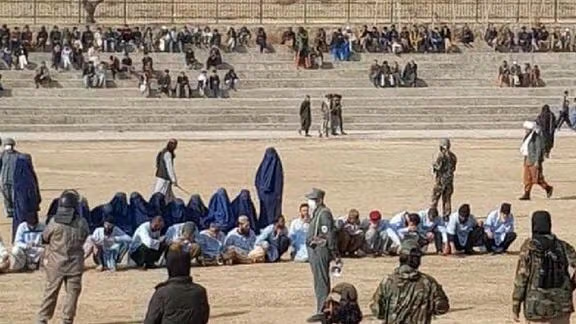
The Taliban’s Supreme Court says 31 people have been publicly flogged in the past week across six provinces, bringing the total number punished in the past month to 81 men and women nationwide.
In its weekly report released Saturday, the court said the latest floggings took place in Maidan Wardak, Kabul, Zabul, Kapisa, Baghlan and Kunduz provinces. It did not provide details about the identities of those punished or the specific charges against them.
Separate court statements earlier in the week said 14 people, including one woman, were publicly punished in Kabul and Zabul on charges of selling and trafficking alcohol, narcotic pills and engaging in extramarital relationships.
The Taliban also said 10 people were flogged in Kabul and Maidan Wardak for theft and drug offences, while eight others were punished in Kabul and Kapisa for narcotics trafficking.
According to the Supreme Court’s figures, 81 people have been publicly flogged across Afghanistan over the past month.
Despite condemnation from international human rights organisations, which classify corporal punishment as torture, the Taliban continues to carry out public floggings, saying they are in accordance with its interpretation of Islam.
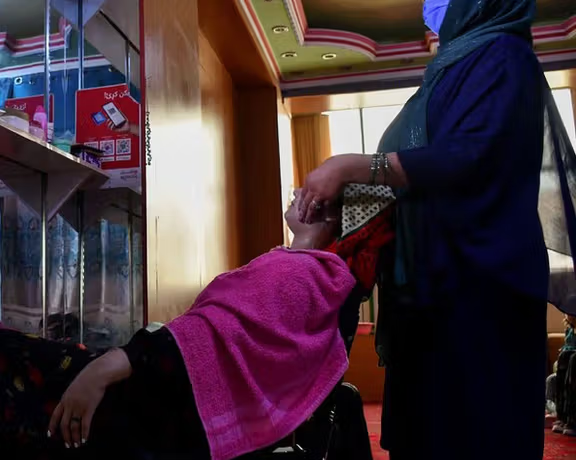
Taliban morality police have been raiding homes in parts of the Afghan capital to shut down in-home beauty salons, destroying equipment and threatening female beauticians and their families with arrest, residents told Afghanistan International.
Nadia (name changed), a resident of Kabul’s District 4, said Thursday that running a beauty salon from her home had been her family’s sole source of income for more than two years.
“I am the sole breadwinner of my family. I pay the rent, buy food, and cover my children’s expenses,” she said. “After the Taliban shut down beauty salons in the city, I moved my work home, but now they say even working from home is haram and I must stop.”
According to Nadia, Taliban enforcers threatened to imprison her husband if she continued. The pressure, she said, has sparked domestic violence. “My husband was terrified. He said we had to go back to our native province. But our financial situation is so bad, I refused. He became angry, took our daughters to the village, and threatened to divorce me.”
The Taliban ordered the nationwide closure of women-run beauty salons in July 2023, a move that the Chamber of Commerce and Industries says left around 60,000 women jobless. Some women in Kabul and other provinces continued operating discreetly from their homes, but the Taliban’s Ministry for the Propagation of Virtue and Prevention of Vice has barred such work, even inside private residences.
Humaira, a resident of the Ahmad Shah Baba area, said Taliban morality officers entered her home, smashed her salon equipment, and warned her to stop working.
“We live in a rented house, and my husband is sick. If I don’t work, who will pay the rent and buy milk for my baby?” she asked.
Earlier reports from Sar-e-Pul province indicated that Taliban forces had conducted house-to-house inspections to close down in-home salons operated by women.

Residents of Panjshir province say the Taliban has intensified restrictions on women’s movement, reportedly preventing those not wearing a burqa from travelling freely and subjecting them and those accompanying them to harassment and violence.
Speaking to Afghanistan International on Friday, several residents reported that Taliban morality police have established new checkpoints across the province, particularly targeting women not dressed in the full-body chadari (burqa).
“In Panjshir today, women are being pulled out of vehicles at checkpoints and harassed for not wearing a chadari,” one local resident said. “Drivers are even beaten for transporting women without one.”
A resident of Rokha district confirmed that Taliban forces have been aggressively confronting women over dress code violations and intimidating the public in recent days.
In addition to the crackdown on women’s dress, locals say the Taliban has also escalated efforts to restrict mobile phone use. Both men and women have reportedly been warned not to carry smartphones, and several residents say the warnings have become increasingly forceful.
“We were planning to travel to Kabul,” one resident said, “but the Taliban stopped us because the women in our group weren’t wearing burqas, even though they were fully covered.”
Local sources say the Taliban began enforcing these new measures on Thursday and that the situation has worsened since.
The reported crackdown in Panjshir mirrors similar actions recently seen in Kabul, where Taliban authorities have arrested women in various districts for what they claim is “improper hijab.”
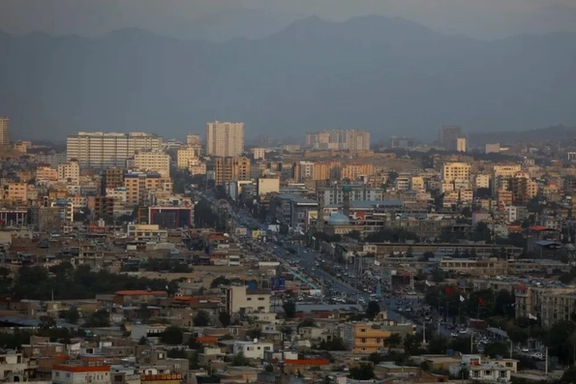
The Taliban has ordered dozens of families living in Kabul’s Police Township to vacate their homes, claiming their property documents are invalid, according to sources speaking to Afghanistan International.
Residents of approximately 250 homes have reportedly been told to leave or risk having their properties seized. Taliban officials have not issued any public statement regarding the evictions.
Sources say Taliban representatives warned that any refusal to comply would result in the confiscation of homes and belongings. Several residents told Afghanistan International Pashto that Taliban forces have been inspecting homes in the area for the past month and have established a committee to oversee the process.
One resident said the Taliban had offered vague or unacceptable justifications for the evictions, with some told simply: “You are young; you must vacate your home.” He alleged that the group intends to replace current residents with Taliban members.
Police Township was established in 1984 on 181 hectares of land with funding from the former Ministry of Interior. The area is home to hundreds of families, many of whom are relatives of police officers killed during the presidency of Mohammad Najibullah, Afghanistan’s former head of state.
Residents say they have lived in the township for nearly four decades. Some claim the Taliban has threatened them not to speak to media outlets or human rights organisations and not to file formal complaints.
One resident said: “The Taliban are banging on our doors, forcing out our women and children, and seizing our possessions. This is not just oppression, it is a silent genocide.”
He provided documents showing his family had lived in the township for over 30 years and held legal ownership of their apartment. Nevertheless, he said Taliban officials told him: “You are from Panjshir, this place is not for you.”
